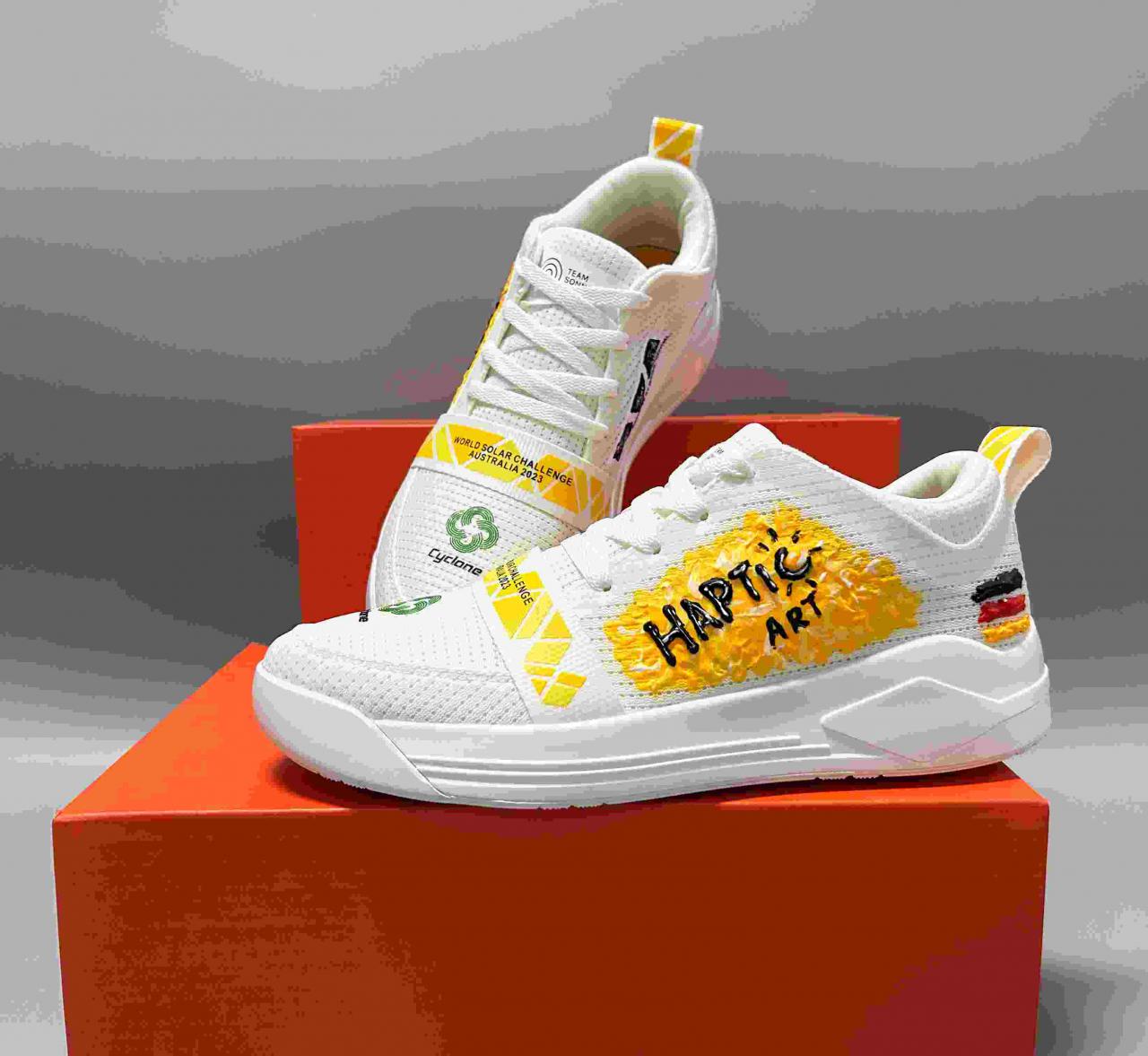● Huafon developed a more sustainable HAPTIC® textile coating solution based on part of the bio-based Impranil® CQ DLS/1 polyurethane dispersion from Covestro
● Official Sonnenwagen Solar Team shorts and sneakers feature new textile coating solutions
● HAPTIC® Art ink solutions enable design versatility and durability while significantly reducing environmental impact
● The fabrics for shoes and apparel are made by Huafon using recycled PET yarn from Sialon®, which has lower emissions during the production process
The Sonnenwagen (Solar Chariot) team, made up of students from RWTH Aachen University and Aachen University of Applied Sciences in Germany, is working on using renewable energy for more sustainable mobility. With their self-built solar racer, they plan to take part again in the Bridgestone World Solar Challenge in Australia in October 2023. Additionally, the team has placed a strong emphasis on using more sustainable sports gear. To support this demand, Huafeng, a leading textile technology company, brought the team sneakers and shorts made from more sustainable raw materials. The sports kit uses a partially bio-based polyurethane dispersion from Covestro, the main sponsor of the Sonnenwagen team.
The new official team kit provided by Huafon includes shorts and sneakers designed with Huafon’s new HAPTIC® textile coating system containing Covestro’s partially bio-based INSQIN® polyurethane dispersion. At the same time, the fabrics of clothing and sports shoes provided by Huafon are made of Cylon Force® recycled polyethylene terephthalate (rPET) yarn provided by Sialon Technology, and these yarns are all from recycled plastic bottles. The upper material is 100% made of Sialon® rPET, and the shorts are made of 86% Sialon® rPET and 14% spandex to ensure wearing comfort.
Lina Schwering, Sonnenwagen Team Manager, said: “Our new official kit looks fantastic and we especially like the sustainability benefits! Combined with the excellent performance, these fit perfectly into our vision for a more sustainable future of mobility. Vision. On our way to realize this vision, we are very grateful to Sialon Technology, Huafon and its HAPTIC® products, and Covestro for their continuous support.”

A new generation of textile coatings
The HAPTIC® Art textile coating used in this sneaker was developed by Huafon using Covestro’s partially bio-based polyurethane Impranil® CQ DLS/1, which enables a particularly outstanding aesthetic appearance and better mechanical properties, reducing the Emissions associated with the production process. The polyurethane system’s high solids content and thixotropic properties help manufacturers achieve high coating thicknesses, making it more suitable for creating coatings with detailed images and complex 3D effects on apparel and footwear.
The HAPTIC® Art ink system applied to shoe upper patterns and textures has been tested for a series of properties such as folding resistance, adhesion, hydrolysis resistance, water washing resistance and abrasion resistance. The excellent test results show that HAPTIC® Art inks are particularly suitable for high-performance sports shoe upper coatings. With its outstanding mechanical properties, Huafon’s ink coating system also recently won the ISPO Best Product Award.
“HAPTIC® Art inks represent a further expansion of our ability to achieve aesthetically pleasing coatings with unusual design versatility and huge environmental benefits,” said Dr. Thomas Schmidt, Director of Innovation and Creation at Huafon, “For example , the new sneakers from the Sonnenwagen team save approximately 260 grams of CO2e* per pair compared to sneakers manufactured using traditional methods. We look forward to developing more sustainable solutions that can help drive the future of textile coatings.”

Towards a more sustainable sportswear industry
With strong environmental attributes, the new HAPTIC® coating system helps meet the growing demand for more sustainable sportswear. Traditional sports apparel and footwear mostly rely on fossil-based PET materials and polyurethane coatings to achieve the desired performance, appearance and durability. Now, by combining Huafon’s textile coatings expertise with Covestro’s partially bio-based INSQIN® polyurethane technology, the Sonnenwagen team’s new equipment demonstrates another viable, more sustainable path.
Dr. Torsten Pohl, Head of Global Textile Coatings at Covestro: “This new textile coating system represents a major step forward in terms of both performance and appearance. Partially bio-based Impranil® CQ polyurethane dispersions from Covestro have contributed to this.” No, the shoe contributes around 80 grams of CO2 savings*. This technology will help apparel and footwear manufacturers produce products that not only look great, but also have a reduced environmental impact.”



 微信扫一扫打赏
微信扫一扫打赏
